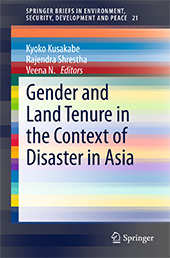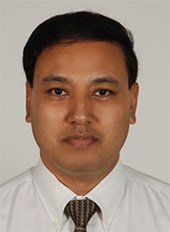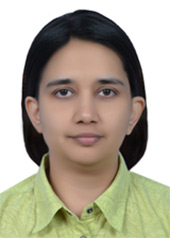|
|
| |
|
| |


SpringerBriefs in
Environment, Security, Development and Peace (ESDP)
A Peer-reviewed Book Series
Edited by
Hans Günter Brauch,
AFES-PRESS, chairman
Free University of Berlin (Ret.)
| Vol 21 |
Kyoko Kusakabe, Rajendra Shrestha, and Veena N. (Eds.): Gender and Land Tenure in the Context of Disaster in Asia. SpringerBriefs in Environment, Security, Development and Peace, vol. 21 (Cham– New York – Heidelberg – Dordrecht – London: Springer-Verlag, 2015)
ISBN (Print): 978-3-319-
ISBN (Online/eBook): 978-3-319-
DOI: 10.1007/978-3-319-
Order this book on the Springer Website
Order electronic version and individual chapters |

|
| |
|
|
About this book
-
This is a unique book focusing on gender, disaster and land tenure, especially in Asia.
-
The case studies from the field stress the importance of land tenure systems during a disaster.
-
This new field of interdisciplinary study introduces new areas of research and policy.
-
Research focuses on India, Indonesia, Malaysia, and Sri Lanka.
This book explores an interdisciplinary field at the intersection of gender and development studies, disaster and land tenure policy. It is well-known that women have weaker claims to land. But how does that translate to increased vulnerability during disaster? Using case studies from Asia, this book argues that land tenure is a key factor in mitigating the impact of disasters on women. The scale and frequency of disasters have been increasing in recent decades due to human impact on the landscape and climate. Unsustainable farming and land management systems have increased environmental risks and social vulnerabilities. However, the costs of disasters are disproportionately borne by women around the world. Women are more vulnerable to disaster due to reduced mobility and lack of control over assets. Post-disaster, women’s vulnerabilities increase due to gendered rescue and rehabilitation practices. A gendered approach to land rights is critical to disaster preparedness and rehabilitation.
List of Contents:
1. Gender and Land Tenure in the Context of Disaster: Veena N. and Kyoko Kusakabe – 2. Gender Impact of large-scale Deforestation and Oil Palm Plantations among Indigenous Groups in Sarawak, Malaysia: Carol Yong and Wee Aik Pang – 3. Displacing Women, Resettling Families: Impact of Landslides on Women’s Land Tenure Rights in Sri Lanka: Subhangi M. K. Herath – 4. Impact of Flash Floods on a Matrilineal Society in West Sumatra, Indonesia: Yonariza and Mahdi – 5. Urbanization and Disaster: Loss of Women’s Property Ownership in Leh, Ladakh: Bhuvaneswari Raman – 6. A Coir Mill of Their Own: Women’s Agency in Post-tsunami Sri Lanka: Ramanie Jayatilaka – 7. Gender, Land Tenure, and Disasters in the Mentawai Islands, Indonesia: Carol Yong, Frans R. Siahaan, and Andreas Burghofer
Content Level » Research
Keywords »
Related subjects »
On the Editors
 |
Kyoko Kusakabe (Japan) is an Associate Professor of Gender and Development Studies in Asian Institute of Technology. She teaches post-graduate courses, carries out research and outreach activities in the areas of gender, work, mobility and development in various countries in Asia. Her recent research is on gender issues in labour migration, cross-border agriculture investment and border trade. Her publication include: Thailand's Hidden Workforce: Burmese Women Factory Workers (London: Zed Books, 2012); (with Ruth Pearson): Transformations of indigenous people’s lives and livelihoods: Mobilities in China, Laos, and India, (London: Routledge, 2013); (co-edited with Ragnhild Lund, Smita Mishra Panda and Wang Yunxian): Gender, road and mobility in Asia (London: Practical Action Publishing, 2012); (with Ruth Pearson): “Cross-border childcare strategies of Burmese migrant workers in Thailand”, in: Gender, place and culture, 20,8: 960-978 (2013).
Address: Assoc. Prof. Kyoko Kusakabe, GDS, SERD, Asian Institute of Technology,
P.O.Box 4, Khlong Luang, Pathumthani, Thailand 12120
Email: <kyokok@ait.ac.th>
Website: <http://www.serd.ait.ac.th/wpserd/faculty/kusakabe-kyoko/>. |
| |
|
|
Rajendra P. Shrestha (Nepal) is an Associate Professor and Coordinator of natural resources management at the Asian Institute of Technology, Thailand. His research interests include human dimension of land use/cover change including land tenure issues, land degradation, natural resources management and Geoinformatics application. He has authored more than fifty articles in internationally referred journals, twelve book chapters and number of workshop proceedings in his area of research interests. He also has co-edited two books on Atmospheric Brown Cloud (ABC); (with R.M. Shrestha, N.T. Kim Oanh, M. Rupakheti, S. Permadi, T. Kanabkaew, and M. Iyngararasan): Emission Inventory Manual (Nairobi: United Nations Environment Programme, 2013); (with Trisurat, Y. and R. Alkamade): Land Use, Climate Change and Biodiversity Modeling: Perspective and Applications (USA: IGI Publishers, 2011).
Address: Associate Professor, Natural Resources Management, School of Environment,
Resources and Development, PO Box 4, Klong Luang, Pathumthani 12120, Thailand
Email: <rajendra@ait.ac.th>
Website: <http://www.asdu.ait.ac.th/faculty/FacultyByID.cfm?FacultyID=424>.
|

|
| |
|
|
 |
Veena N. (India) was a journalist in India, Tanzania and Thailand before moving into academia. She is a freelance researcher and writer with interest in the fields of gender, indigenous culture and development. Her publications include: (co-authored with Anitha Venkatesh): “Mobility patterns and gendered practices among Soliga people in Karnataka, India”, in: Gender, Mobilities, and Livelihood Transformations: Comparing Indigenous People in China, India, and Laos (London: Routledge, 2013); (co-authored with Govind Kelkar and Girija Shrestha): “Women’s Agency and IT Industry in India”, in: Gender and the Digital Economy: Perspectives in the Developing World (New Delhi: Sage, 2005); (co-authored with Kyoko Kusakabe): “Women’s Work, Men’s Fantasy: The Internet and Sex Work in Thailand”, in: The Gender Politics of ICT (London: Middlesex University Press, 2005).
Address: Veena N., Gender and Development Studies, SERD, Asian Institute of Technology,
Khlong Luang, Pathumthani, Thailand 12120
Email: <veena.n@ait.ac.th>. |
| |
|
|
On the Editors
Bhuvaneswari Raman (India) studied at the School of Planning and Architecture in Chennai, Asian Institute of Technology, Bangkok and at the London School of Economics, UK.
Andreas Burghofer (Austria) is an activist of human rights and environment non-government organizations of long-standing experience, with an engineering background. Over the past two decades, he has been actively involved with the journal INDABA on Southern Africa. He has also been involved for many years with the magazine bedrohte völker [threatened people], which focuses on minorities and endangered people. He has published numerous articles and book reviews in magazines and German-speaking media on issues of environment, biodiversity, minority rights and politics.
Ramanie Jayatilaka (Sri Lanka) is an Associate Professor in Sociology at the University of Colombo. She is a Board Member of the Centre for Women’s Research (CENWOR) and Board Member of Sri Lanka Centre for Development Facilitation (SLCDF). Her research interests are in the areas of gender issues, international female migration, participatory rural development and social aspects of health.
Mahdi (Indonesia) is a chair of Integrated Natural Resources Management field of Study at Graduate Programme of Andalas University in Padang, Indonesia. He obtained his PhD in Natural Resources Management from the Asian Institute of Technology (AIT) Thailand. His research interests include natural resource and economic aspects of natural and environmental resources.
Frans R. Siahaan (Indonesia) is an environmental justice activist with extensive experiences in community organizing, indigenous peoples’ rights, and natural resources governance. He has worked for almost 11 years with Yayasan Citra Mandiri (YCM), an NGO that works with the Mentawai people.
Wee Aik Pang (Malaysia) is a Sarawakian who has spent the last two decades learning and engaging with mostly indigenous communities of his home state while making sense of the anthropological and sociological imaginations of societies in general but communities in specific. He continues to work with and challenges some rural communities on development discourses while trying to comprehend the people’s worldviews. He also conducts independent research and writes on community challenges and related issues.
Yonariza (Indonesia) is a professor in forest resources management at Andalas University, Padang. Indonesia. He has published book chapters, journal articles, discussion papers, and conference proceedings. His topics cover local forest management policy, the rights of indigenous people, post-logging ban timber tree planting in Thailand and the Philippines, relationship between protected area and local livelihood, irrigation management, decentralization policy and revitalization of local institutions for protected area co-management, rural household participation in timber felling in a protected area, and Southeast Asia land and resources tenure. He received research grants from the Toyota Foundation, Nippon Foundation, and Ford Foundation as well as from the government of Indonesia.
Carol Yong (Malaysia) is a feminist advocate activist with many years of experience in researching, writing, community training and interpreting-translating, with a focus on the rights of indigenous people, especially indigenous women in Asia, and development issues. She has acted as external consultant on evaluations of NGOs in Indonesia; gender, community-based and participatory action research; and analysing forest policies and practices for international organizations. |
|
|
|